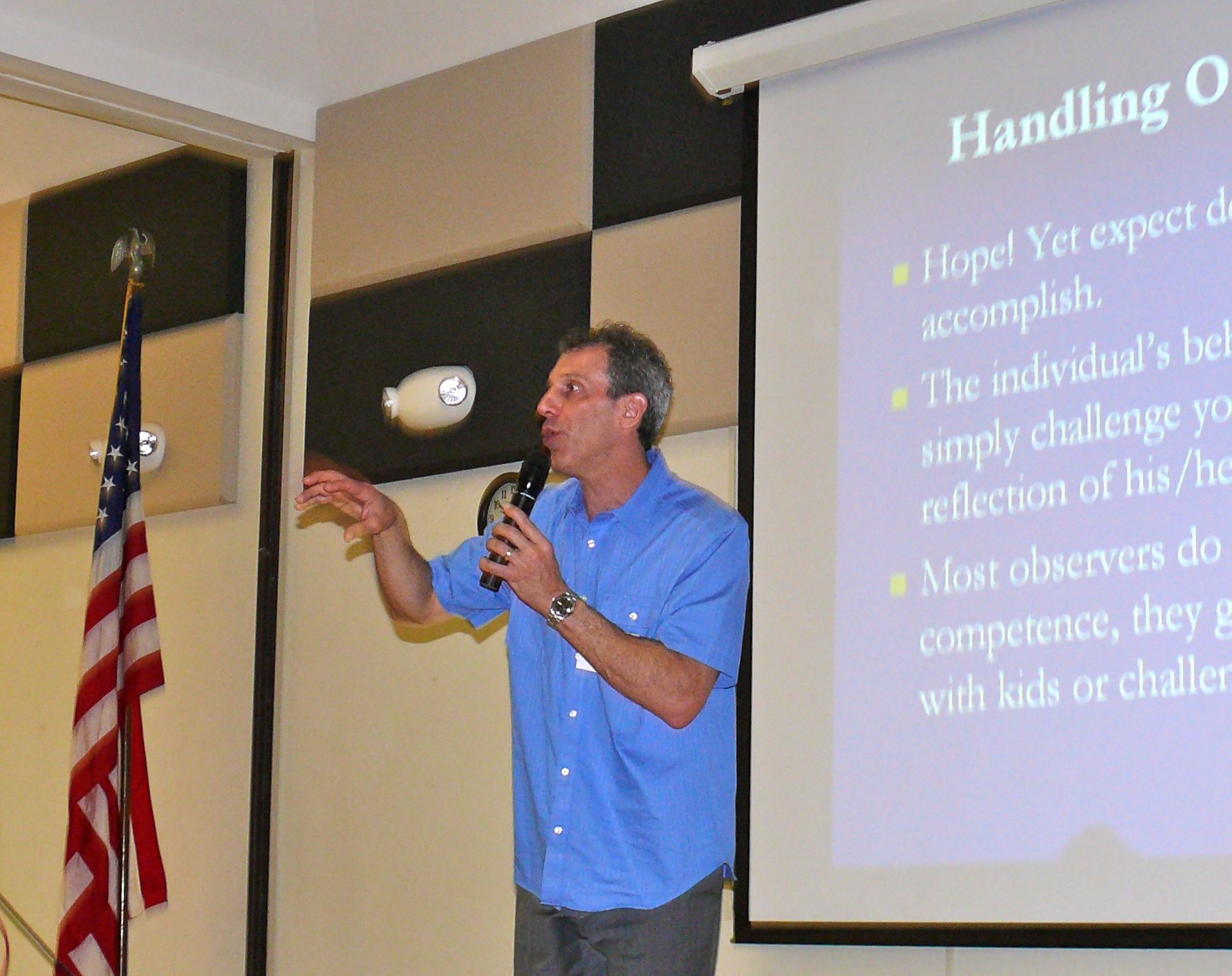
The conference, sponsored by the V.I. University Center for Excellence in Developmental Disabilities and the V.I. Autism Network, drew an audience of about 200 to UVI’s St. Croix Campus to hear leading experts in the field of autism research offer practical advice. The conference was held on St. Thomas Tuesday and St. Croix Wednesday.
About one in 150 American children have an autism spectrum disorder, according to the Centers for Disease Control and Prevention.
Working systematically to understanding why a person with an autism spectrum disorder is acting out in a particular situation enables parents to come up with effective approaches to forestall crises, help their child cope socially, and progress in school, said keynote speaker Jed Baker.
Baker is director of the Social Skills Training Project, an organization serving individuals with autism and social communication problems. He has authored five books that are handbooks and guides to social skills training for children with autism spectrum disorders, including his most recent tome, "No More Meltdowns: Positive Strategies for Handling Out of Control Behavior."
Most people have "mirror neurons" that prompt mimicking behavior like smiling in response to a smile or laughing when we hear laughter and so forth, Baker said. But often, children with an autism spectrum disorder do not respond the same way and so behave in a socially awkward fashion at times, unless they can train themselves to respond appropriately as they mature.
Many children with autism have difficulty with abstract thinking and taking the perspective of another person, Baker said.
"When you have trouble with abstract thinking you are going to have trouble understanding other people’s points of view," he said.
That can lead to completely unintentional misbehavior, Baker said. "For example, say I don’t know to open the door for you while you are struggling with a load of packages."
Combine that with trouble fully understanding the social implications of language and you have a recipe for trouble, he said. Baker recalled a student who, nervous about going to a new class, blurted out "Russian women are all [a derogatory word]" upon meeting a Russian girl, instead of saying hello.
The child had no hurtful intent and did not understand what the problem was, said Baker. Trying to persuade the child it was a hurtful thing to do may not work well, because the child has little conception of the other person and may say "I don’t care, I don’t want her in this class," Baker said.
But, knowing a little about how the child’s mind works, you could try appealing to his self-interest and say other people in class heard it, too, and they thought it was mean and now they don’t want to play with him, he suggested.
Children with an autism spectrum disorder also have a very low tolerance for frustration and can go into deep meltdowns when confronted with changes to their routines or with overly loud and chaotic situations, he said.
But Baker said, "You don’t have to have a disability to get frustrated easily," noting that simple sleep deprivation has a similar effect, shutting down the reasoning and planning centers of the brain.
Baker went on to lay out a menu of approaches to preventing and ending emotional meltdowns, with concrete advice. He urged parents, for instance, to avoid accidentally escalating a situation by leaping straight into punishment. A typical uncontrolled escalation might occur, say, when a child acts out in class and you tell him or her they get no recess, he suggested.
The child gets angry at no recess so they throw something, so you escalate and tell the child they now have a week with no recess, prompting the child to get even more frustrated and act out more—until there is a full-blown crisis.
That does not mean you accept bad behavior, just that escalating punishment is unlikely to help, unless the child sees hope of relief and not just more and more frustration.
Once a meltdown is fully under way, reason is gone, and new strategies are needed. Distraction is often very effective, he said. Baker carries around Pokemon cards for just that purpose and has distracted children out of their tantrum by pulling out a card and asking "Is this a rare card?"
But you need to understand why the bad behavior is happening, too. Sometimes the child is trying to avoid something they do not like doing. Then distraction ends up reinforcing the behavior because they avoided what they wanted to avoid.
With an autistic child, the reasons may not be obvious, too. One child kept pushing and shoving in line for the water fountain at recess and was punished again and again by being made to go to the end of the line. But the punishment had no effect.
It turned out the child wanted to wait until no one was using the fountain, so he or she wanted to be last. So they changed the punishment to being first to drink at the fountain, and the behavior changed, Baker said.
After Baker’s address, the conference goers broke out into smaller groups for discussion of specific topics. Jennifer Bogin, a board certified behavior analyst with the Association of University Centers on Disabilities, spoke about helping youth with autism spectrum disorders function in inclusive classrooms.
Stephanie Barnes, the V.I. Territorial ADA Coordinator and founder of the V.I. Autism Network, gave a session talking about autism from the perspective of a parent. And Baker gave a second talk, focused on social skills training.